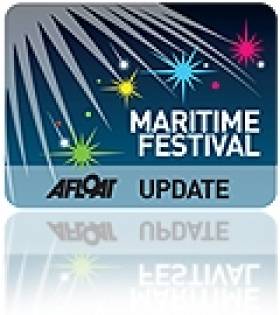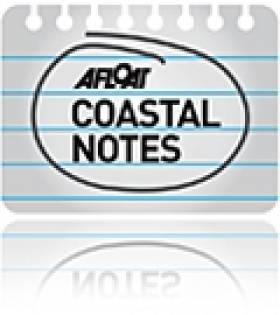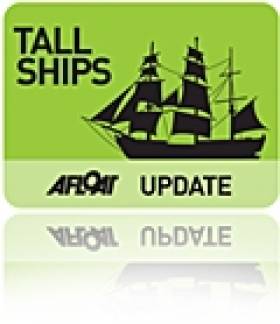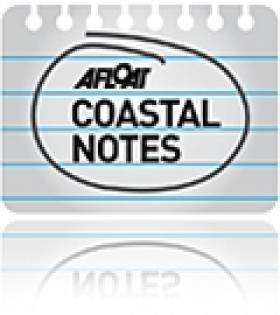Displaying items by tag: Begnet's Boats Project
#OceantoCity – The winner of this year's 10th Ocean to City Rowing Race 'An Rás Mór' went to the brand new Dalkey community built currach Naomh Beagnait which was only launched at the start of June, writes Jehan Ashmore.
Naomh Beagnait (see photo) was competing in the event which attracted 500 rowers amongst some 120 craft including overseas entries in a celebration of Cork's maritime heritage.
The Dublin Bay based currach was constructed in Dalkey over the month of May and is based on the racing currach design from Inishbofin Island.
"To each person who sawed, sanded, steamed, donated money, encouraged, baked cakes, publicised, wrote articles, followed us on facebook, blessed the boat, you were a winner on Saturday in Cork" said Liz Murray who had the vision behind the Begnet's Boat Project.
She added "especially thanks to Dalkey Rowing Club who came to our rescue only a fortnight before Mark Redden who led the boat-building trainee team which used their boatshed. A true community effort by all involved".
Redden who is based in Barcelona and his Catalan rowers led the 7m (22ft) currach to victory with the 1st Ocean Race but also taking honours in the 1st Currach Ocean category representing Base Náutica de Barcelona (Repararems).
Naomh Beagnait will take centre-stage next Saturday (15 June) at The Inaugural Dublin Currach Regatta (2.30pm - 7pm) at the East Wall Water Sports Group in Clontarf and where the free event is sponsored by the Dublin Port Company.
Take in the sights and sounds of this most traditional of boating events at the Tolka Estuary, off the Alfie Byrne Road. Presentations will take place in the Poolbeg Boat and Yacht Club, Pigeon House Road, Ringsend on the south side of the Liffey.
Currach racing at National League Level are to be held on the previous day, Friday (14 June) for details visit this link.
#DalkeyCurrach – Along with all the Tall Ships and Old Gaffers heading for Dublin Port, there's another treat in store this June Bank Holiday weekend, when a brand new currach is to be launched from Dalkey, writes Jehan Ashmore.
As previously reported on Afloat.ie, Coliemore Harbour is where the locally built currach is to be launched this Saturday 1 June, (late afternoon).
The month-long construction period is the culmination of the Begnet's Boat Project which involved trainees building Naomh Beagnait, (see photos) and with the support of the community.
Measuring 7m (22ft) long, the craft is based on a Connemara racing currach and its construction was under the supervision of boat-builder Mark Redden.
The project is the vision of Liz Murray who undertook the task with fundraising efforts that continue tomorrow evening (Friday 31 May) when the currach is to be put on public display for the first time at the Dalkey Tramyard.
Naomh Beagnait is named after the local Saint Begnet, where there are two churches in her name, one is located on Dalkey's main street (Castle Street) and the other on Dalkey Island.
The new currach is to highlight the inherent value and craftsmanship of the ancient Irish techniques of boat-building. Equally important the project is to foster and strengthen the creative, spiritual and maritime links between Dalkey (the former principle medieval port for Dublin) and the island.
The currach will be carried aloft as in the traditional manner with a procession starting from the ruins of Saint Begnet's church on Castle Street to Coliemore Harbour.
A flotilla involving Dalkey Sea Scout boats from neighbouring Bulloch Harbour and currachs from Ringsend will be 'dressed overall' when they accompany Naomh Beagnait on her maiden voyage across Dalkey Sound.
Currachs, Old Gaffers & Tallships to Gather in Dublin Bay Races over June Bank Holiday
#Currachs&Tallships – Three events are scheduled to take by place in Dublin Bay over the June Bank Holiday, writes Jehan Ashmore
As previously reported on Afloat.ie, Coliemore Harbour in Dalkey is where a pair of racing currachs for the Begnet's Boat Project are to be launched on Saturday (1 June) and rowed if not raced! across the sound to Dalkey Island.
The currachs are to be constructed locally with the support of the community which is to foster and strengthen creative, spiritual and maritime links between the town (the former medieval port for Dublin) and Dalkey Island.
In addition the community are invited to take part in accompanying projects, one in which includes a 'St. Begnet's Cookbook' which features seafaring recipes by Elaine Flood which are to be put to good use in feeding the boat-building team during the month-long currach construction.
Currently there is a fundraiser campaign with a reward scheme, noting a countdown of only three days remain before closing date. To learn more about this project and to help in funding, click HERE.
The Old Gaffers Association (OGA) which as previously reported on Afloat.ie are to celebrate their Golden Jubilee, where also on Saturday (1 June) larger craft are to participate for the RMS Leinster Trophy from Dun Laoghaire Harbour and surrounding islands and buoys to Poolbeg Y & BC Ringsend.
On Sunday (2 June), the Howth 17's are also to join in the action on the Liffey with a 'race between the bridges' having set off from Poolbeg, where most of the Dublin OGA branch members are based.
On the following Monday, (3 June) is the race for the new OGA Asgard Trophy. The trophy is made from a variety of spare timbers saved by John Kearon, conservator of Erskine Childers' Asgard.
All being well, the gathering of the OGA's one design class of classically gaff-rigged boats should present a glorious sight in Dublin Bay, with fellow Old gaffers fleets joining in from the Isle of Man, Scotland and England as part of the Golden Jubilee's clockwise cruise circuit of the UK.
The third event is the arrival of six tallships from Belfast which are to descend in the capital port on Friday (31 May). They will remain in port over the four-day long inaugural Dublin Port River Festival, an initiative of Sail Training Ireland.
This can only add to a sea of masts, albeit not like last year's Tall Ships Festival, yet however is still something to look forward... during those early days of June.
Begnet’s Boat-Building Currach Project Bound for Dalkey Island
#Begnet'sBoats – A community-led project to build a pair of currachs in Dalkey, Co. Dublin is gaining momentum as locals participate in a goal to launch the boats from Coliemore Habour on 1 June, writes Jehan Ashmore.
The Begnet's Boats Project is the vision of local resident Liz Murray who was inspired to bring the community together in a creative approach and to reflect the rich maritime heritage of Dalkey and local saint of St. Begnet. There are two churches in her name, one located in the town and the other on the small island lying some 300m offshore.
Murray has assigned a team to construct the pair of 'racing' currachs and they are to be led by boat-builder Mark Reddon. In addition the community are invited to take part in accompanying projects, one in which includes a 'St. Begnet's Cookbook' which features seafaring recipes by Elaine Flood.
The highlight of the venture will be a parade of the boats which are to be carried upside down, as is the traditional manner, from Castle Street, the town's main street to the coast at Coliemore Harbour.
From there the currachs, to be named 'Naomh Beagnait 1 & 2' will ceremoniously be rowed if not raced! across Dalkey Sound to the island, where the first reference to St. Begnet on the island dates to 700 A.D.
Information in how to get involved including a reward scheme and fundraiser countdown campaign can be viewed by visiting: www.fundit.ie/project/begnets-boats-project-2013
It would seem that the only way to get to Dalkey Island these days is by privately-owned craft and as previously reported on Afloat.ie, Coliemore Harbour has not had access to a ferry boat service in recent years. The harbour has been the traditional embarkation point for generations.
Currently engineering consultants are carrying out a structural survey and report due to be completed around May. The consultants were contracted by Dun Laoghaire-Rathdown County Council who had deemed the harbour unsafe and not suitable for use by a commercial ferry operator.
The delay in restoring a licensed ferry service has led to a campaign by locals, businesses and community groups who have feared that an alternative longer term ferry service would operate instead from either Bulloch or Dun Laoghaire Harbour.

































































